- Home
- Maggie Alderson
The Scent of You
The Scent of You Read online
Dedication
For Mark Connolly
(Musc Ravageur by Frédéric Malle)
and
Josephine Fairley
(Mitsouko by Guerlain)
I want to see you
Know your voice
Recognise you when you
first come ’round the corner.
Sense your scent when I come
into a room you’ve just left.
Know the lift of your heel,
the glide of your foot.
Become familiar with the way
you purse your lips
then let them part,
just the slightest bit
when I lean in to your space
and kiss you.
I want to know the joy
of how you whisper
‘more’
Rumi (1207–1273)
Contents
Dedication
I think in perfume
Thursday, 31 December
Friday, 1 January
The scent of . . . yoga
Monday, 4 January
The scent of . . . the elders
Tuesday, 5 January
Wednesday, 6 January
The scent of . . . a daughter
Monday, 11 January
The scent of . . . university days
Tuesday, 19 January
Wednesday, 20 January
The scent of . . . a dog
Friday, 22 January
Thursday, 28 January
Wednesday, 3 February
Thursday, 4 February
Thursday, 18 February
Friday 19 February
Monday, 29 February
Monday, 14 March
Thursday, 17 March
Monday, 21 March
The scent of . . . a son
Wednesday, 23 March
Sunday, 27 March
The scent of . . . Easter
Thursday, 31 March
Friday, 1 April
Monday, 4 April
Tuesday, 5 April
The scent of . . . an ending
Saturday, 9 April
Monday, 18 April
Monday, 2 May
The scent of . . . a wedding
Acknowledgements
Praise
About the Author
Copyright
FragrantCloud.net
I think in perfume
I experience the world through smell – I always have. Smell isn’t a subsidiary sense to me, it’s always been up front, equal with seeing, hearing, feeling and tasting.
While I can’t remember a time when I wasn’t sniffing things – everything! – I discovered the miracle of perfume as a very young child through the fragrant delights on my mum’s dressing table. It was the pretty bottles which attracted me initially, but once I got a whiff of what was inside, my world changed forever.
My mother is the model Daphne Masterson, known for the iconic pictures taken of her by Cecil Beaton, Norman Parkinson and others for Vogue in the 1950s (although she still hasn’t retired at the age of eighty-five!), and she had a pretty amazing collection of perfumes, many of them given to her by the couturiers themselves, Christian Dior, Hubert Givenchy and Pierre Balmain, to name a few.
She was away a lot working when I was little, and as a lonely only child I’d go and take the caps off those tempting flacons and sniff them to find the ones that most reminded me of her. Sometimes I’d even take a bottle to bed with me for comfort.
So, without understanding what I was doing, I honed my appreciation of fragrance by comparing all the different perfumes she had and forming associations with each one.
Balmain’s Jolie Madame was ‘shopping’, Fracas was ‘parties’, Calèche was ‘Mummy going away’, Diorissimo was ‘Easter’, Joy was ‘Mummy going out for dinner’, and so on.
I had an exercise book that I kept by my bed and every night I would write about what I’d smelled that day and found interesting. Not just perfumes – although I tried as many of those as possible – but also things like butter heating up in a frying pan, a new school jumper, my cat’s head, the plastic feet of my Barbie dolls: how they all smelled and how they made me feel.
I still think of perfumes and smells in this way. It’s the emotional associations which really interest me. There are lots of amazing perfume bloggers who write brilliantly about scent from historical, fashion, business, sociological, scientific, gastronomical, business and new-release perspectives. I love all that and will write about those elements too when I can, but my passionate interest is in that powerful emotional connection a smell can trigger.
When I list in my posts the particular scents that represent an occasion, an idea, a person or a group of people, it’s not necessarily an exact ingredient match, or what a particular person would actually wear, but simply what feels right to me. I go for the gut inspiration, the first associations that spring into my head from my heart and my olfactory bulb.
Some of the perfumes I refer to you will know; others are obscure, produced by small niche brands; and there are some that are no longer made, but that I’ve been lucky enough to sample in various people’s collections, including my mum’s.
Sometimes I hope you’ll agree with me, other times I’m sure you won’t – so please tell me what you think and what your own scent associations are. I’d love to hear from you.
Thanks for looking – and keep on smelling.
Polly
PS As well as sniffing my mum’s precious bottles, I loved squirting the perfume onto myself, so from a very young age I walked around in a rather overpowering haze of scent. My father started calling me Fragrant Cloud, after his favourite rose – hence the name of this blog.
COMMENTS
JayneAgain: I love this! I used to try all my mum’s perfumes, too, when I was a little girl. She died last year and every time I want to feel close to her I spray on some of her Calèche. I really look forward to reading more of your posts.
FragrantCloud: Thanks Jayne – I’m so sorry you lost your mum. I’m so glad you liked my blog and thanks for signing up. Polly x
AgathaF: This is very interesting. I love perfumes too. I live in Germany.
FragrantCloud: Hi Agatha. Thanks for reading my blog. Let me know what’s happening with the perfume scene in Germany. I’d love to know. Polly x
EastLondonNostrils: How about posting a pic of your mum’s perfume collection? ELN
FragrantCloud: That’s a great idea ELN, I will! Thanks, Polly x (and thanks for signing up to the blog too)
Thursday, 31 December
TWO YEARS LATER
When you’ve been happily married for twenty-four years, you don’t expect to find yourself lying in bed alone just before midnight on New Year’s Eve.
Polly didn’t even know where her husband was. She hadn’t seen him for over a week. It had been so strange having Christmas without him, and now this.
She pulled the duvet up over her head and then straight back down again. It was no good, she couldn’t sleep through it.
Growing up, she’d celebrated every New Year at her grandparents’ house in the Scottish Highlands with all the traditional celebrations, and she’d always loved it. Her body was biologically programmed to stay awake on 31 December.
She’d thought spending the whole day cleaning the house – one of her granny’s New Year rituals – would have tired her out, but it seemed not. Even a couple of drams of her dad’s favourite single malt hadn’t done the trick; in fact, it seemed to have had the opposite effect, making her feel hyped up and ready for action rather than sleep.
She picked up her phone, looking for a distraction. But Facebook was full of people boasting that they were going to bed becaus
e they loathed the occasion, and Instagram was all drunken-party pictures.
Her daughter Clemmie beamed out of a photo with her boyfriend, taken in Cambridge, where she was studying Medicine and lived full-time. Polly’s son Lucas, home from his first term at uni for the Christmas holidays, was out somewhere in London with friends, and had posted several snaps of pub tables covered in empty beer and shot glasses. He’d be a mess in the morning.
Polly checked the time. Five to twelve. She turned the radio on and got out of bed, heading over to the window with her whisky tumbler.
Opening the curtains, she peered out at the clear black night, the stars shining brightly. A splendid near-full moon hanging right in the middle of the view just made her solitude more painful.
How lovely it would be to look up at that glowing disc with strong arms around you, wondering what the year ahead would bring. For the two of you. You and your husband.
As the chimes of Big Ben rang out, she raised her glass.
‘Happy New Year, David,’ she said, ‘wherever you are.’
She took a sip then raised the glass again.
‘Happy Hogmanay, Daddy,’ she followed up, picturing the beautiful strand of beach in Sunderland where they’d scattered his ashes three years before.
She swirled the Scotch in the glass and lifted it to her nose, closing her eyes as she breathed in the peaty aroma, feeling transported back to her grandparents’ house. Pine trees, wood smoke, damp dead bracken and the metallic sweetness of frost in your nostrils. Her granny’s heather perfume, the dusty warm wool smell of a kilt, the lanolin of itchy jumpers, wet dogs and furniture polish.
She took a sip then, just as she was raising the glass again to her toast her children, the land line rang. She ran to grab it, thinking it would be one of them wishing her a happy New Year, but it was her mother’s voice she heard.
‘When are you coming to lunch?’ her mother snapped.
‘Monday, Mummy,’ said Polly, as brightly and calmly as she could, walking back to the bed, sinking down onto it and closing her eyes. ‘In four days.’
‘Are you sure?’ said her mother, in a suspicious voice.
‘That’s what we arranged,’ said Polly, ‘but I can come sooner if you’d like me to—’
‘Hmmph,’ said her mother dismissively, then hung up without another word.
‘Happy New Year, Mummy,’ Polly whispered to the dial tone, then fell back onto the softness of the duvet, tears stinging her eyes. Mostly her mother was fine, but these odd moments of disconnectedness were becoming more frequent, and Polly found them very difficult to deal with. On top of everything else that was going on, it was just too much.
A moment later, she sat up and reached for her mobile to see if Clemmie or Lucas had messaged her. Nothing. Then, seeing the Instagram icon, she tapped it and there was Clemmie’s smiling face, holding up a sign saying ‘Happy Hogmanay, Mum!’
Polly kissed the screen. That was her Clemmie. Such a loving, thoughtful girl; she’d never forget her mum and how important this night was to her. Polly had told her kids she was going out with friends herself, so they wouldn’t worry about her, but her darling daughter had still made the effort.
Then the phone pinged announcing a text. Lucas. Her boy.
A long string of emojis: a smiley face with heart eyes, hearts in every colour, fireworks, flowers, cocktail glasses, champagne bottles, high heels, lipsticks, shooting stars, a full moon and some random cute animals.
Polly laughed. It was so like him. No words, just pictures, but she knew exactly what he meant. She replied with six glasses of beer followed by a piano keyboard, a drum kit and several guitars, and ended with a line of pink hearts.
She started another emjoi message but deleted it. She knew she had to leave him to it – and since she’d told him and Clemmie that porky about going out herself, she had to keep up the act. There wouldn’t be much time for texting if you were out having a good time.
And at least she would see him at some point tomorrow. Lucas still considered the family house his home and slept in his childhood bedroom, the walls plastered with Tottenham Hotspur regalia.
Clemmie’s old bedroom was now a stark spare room, with all her things taken to her Cambridge flat or stashed in the attic, the pink pussy-cat wallpaper she’d chosen when she was nine painted over in tasteful grey. In weak moments Polly still found herself drifting in there, half-expecting the ranks of Sylvanian Families and teenagers’ posters still to be in place. It never stopped being painful that they weren’t.
She checked her texts again. Nothing from David. She wondered if she should send one to him, but had no idea what time it was in Nepal. If he was even still there. She’d established that that was where he’d gone first – something to do with Gurkhas, for a book he was writing – but he hadn’t said how long for.
Then she remembered he’d changed his phone number too. And not given her the new one. It was all part of ‘needing some space’, he’d told her, before setting off on a six-month research sabbatical with no notice. Just an email. And by the time she got it, he’d already packed up and left.
She practically knew it off by heart, but kept a printout next to the bed so she could remind herself she wasn’t imagining it whenever she needed to, which was quite often. This was one of those times.
Dear Polly,
I know this will be hard for you to understand, and I barely understand it myself, but I need some time completely alone.
The university has agreed to a six-month research sabbatical and I’ll be travelling for all of that time. It will be easier for me if we have no contact while I’m away, so I won’t be using my current phone or email address.
Please try to understand that this has nothing to do with you, or anything you’ve done. It’s all about me. It’s not that I need time away from you specifically, but that I need time completely alone. I have no choice.
When I come back I will be able to explain it to you better.
Please don’t press me for more explanations before I go, as I have nothing more to tell you than this and I want to minimise friction between us. And please don’t try to make inquiries after I’ve gone, or discuss it with anyone else. No one knows any more than I’ve told you here.
As far as everyone – especially the university – is concerned, I’m away on a research trip and it’s vitally important that we keep the exact nature of my absence between us. It could create profound difficulties for us if you don’t.
I’m more sorry than I can say to put you in this situation. You don’t deserve it, but I have no choice, and it will be far worse for us both – and the children – if I don’t do it.
D x
P.S. I’ve written separately to the kids, to say I’m going away for work and will be out of touch with you all for a while. That’s all they need to know and it will be better if you don’t discuss it with them in any more detail than that.
Polly sighed deeply. Thinking about him and all that weirdness made her feel so mixed up. She felt physically tired, but her mind was racing. Trying to get comfortable, she pulled the duvet up, then threw it off again, lay on her front and on her back, but nothing was any good. Then she had an idea, got out of bed and ran downstairs into the kitchen.
Digger – David’s dog, who he’d wanted and chosen from the shelter and had now left her to look after – was asleep in his bed by the radiator. He woke up when he heard her come in and wagged his tail weakly in what seemed like a demonstration of canine good manners, like standing up when a lady came into the room.
‘Come on,’ said Polly, lifting him and burying her nose in his furry neck. ‘You can come up and sleep on the bed tonight. If I’ve got to look after you, I might as well get something out of the deal.’
She carried him up the stairs, because David had trained him never to go further than paws on the first step. As they ascended, Digger turned his head from side to side, taking in the unfamiliar territory, then sniffed the covers as she put him
down on the bed and climbed in on the other side. Digger immediately stood up, clearly nervous in the unknown – and forbidden – surroundings.
‘It’s OK, Diggie,’ said Polly, stroking and patting him until he lay down on the bed and put his head on one paw, looking up at her with anxious eyes. ‘It’s just for one night and no one will know. I need a bit of company and you’re all I’ve got tonight.’
The dog yawned and seemed to settle, and Polly let her eyes close – only to have them snap open as a terrible smell drifted over to her. One of Digger’s industrial-strength farts.
‘Oh no,’ she said, pulling the covers up to her nose. ‘I do wish you wouldn’t do that, Digger.’
She used the duvet to fan the air, then turned to look at the rank of perfumes on her bedside table, all in their original boxes.
What would be good to drown out extreme canine flatulence? A heavyweight oud for strength? It would do the job but would be too heady to sleep with.
Perhaps a tuberose, she thought. Very pervasive, but not headachy. Her fingers lingered for a moment over her bottle of Fracas. She adored the classic punchy floral, but it was one of her mother’s favourites, so not conducive to a good night’s sleep either. Not after that phone call earlier.
Maybe something woody? The black tea, leather and tobacco in Atelier Cologne’s Oolang Infini would be deep enough to drown out Digger’s pungent expulsion, yet subtle enough to sleep on. But no, the guaiac wood in it reminded her too much of old-fashioned coal-tar soap, which was David’s smell.
It had been one of the first things she’d noticed about him when they’d met at a cocktail party for postgraduate students. She’d just been starting her PhD at King’s College London, where he was already a lecturer.
Since he’d gone away, even the faintest hint of a tarry smell sent her into a confused spin. She made a mental note to put the Oolang Infini back in her perfume cupboard.

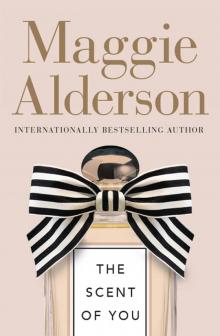 The Scent of You
The Scent of You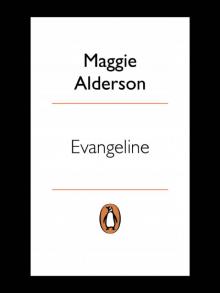 Evangeline Wish Keeper's Helper
Evangeline Wish Keeper's Helper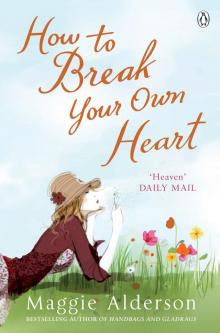 How to Break Your Own Heart
How to Break Your Own Heart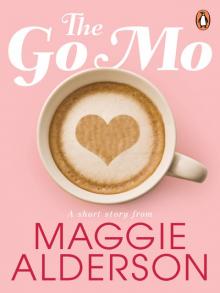 The GoMo
The GoMo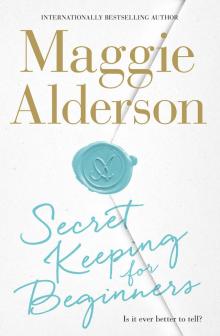 Secret Keeping for Beginners
Secret Keeping for Beginners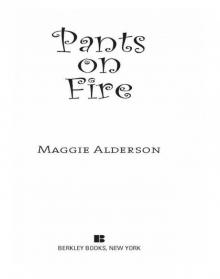 Pants on Fire
Pants on Fire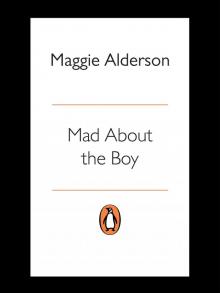 Mad About the Boy
Mad About the Boy Handbags and Gladrags
Handbags and Gladrags Cents and Sensibility
Cents and Sensibility